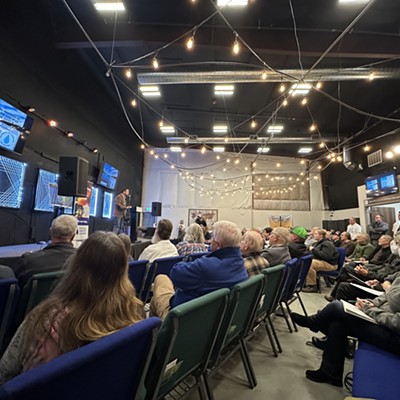Josh Neblett got the idea from a professor at Gonzaga. The business-class teacher was giving examples of a good elevator pitch. One was the idea for a business that would bundle together the best environmental products, thoroughly vetted to be genuinely environmentally sound, and sell them online. Neblett got permission to borrow the idea for a local business-plan competition.
He won. Not only that, but in 2008, thanks to a little more investment, the plan turned into an actual business: Green Cupboards.
The road to opening the business had its bumps, though. Ultimately, the central idea of the original plan — selling only the top environmental products — was found to be financially unsustainable. So Neblett and his partners tweaked it. They innovated.
Today, Greencupboards.com sells 15,000 unique items — from baby shampoo to electric scooters to pet-odor eliminators — from over 600 suppliers. They’ve only been around for a few years, but the growth has been phenomenal. The company now employs 53 people and does nearly $15 million in business.
Green Cupboards is just one of several companies in Spokane that are not only intentionally making choices to help the environment — they’re saving money doing it.
For Green Cupboards, that’s meant establishing a network of different warehouses and networks nationwide.
“Shipping sunscreen is different than shipping organic mattresses,” says Neblett, 26. (Green Cupboards pays for UPS’s “carbon neutral” shipping — which subsidizes things like treeplanting and wastewater treatment — to offset the environmental impact of cross-country shipping.)
And while numerous companies sell environmentally friendly products, the key for Green Cupboards is understanding that not all environmentalists want the same things. Some care about organic products, some want carbon-neutral products, others want handmade, fair-trade, or gluten-free.
The Green Cupboards website allows would-be buyers to browse using 19 different “Eco-Traits” running the gamut from kosher to vegan to recycled. That’s innovative.
Power Dynamics
Massive power utilities aren’t usually lumped in with environmentally friendly businesses. And indeed, Avista Utilities has received its fair share of criticism from local environmental groups frustrated with the impact of hydroelectric dams on the river.
But Avista can trumpet genuine environmental accomplishments. And this year, it has a unique one: They’re converting their entire fleet of 125 light-duty trucks (the kind workers use to visit electrical meters) to run on compressed natural gas.
For a fossil fuel, natural gas burns a lot cleaner than gasoline.
The best-designed cars running on natural gas, reports Natural Gas Vehicles for America, emit 20 to 30 percent less carbon dioxide.
“You can literally take your finger on the tailpipe of a natural-gas vehicle, and it won’t come out black,” says Ken Bonni, strategic initiatives manager for Avista.
Avista has already converted 20 trucks, with plans to convert the rest over the next five years.
Because natural gas is a mere $1.50 per gallon, Bonni says, it will save money as well. He guesses that by converting the whole fleet, Avista will have made up the cost of the conversion in savings. (The company says it does not use natural gas obtained through the controversial “fracking” process.)
At the end of the year, Bonni hopes, Avista will make a natural-gas fueling station available to the public. While electric cars haven’t quite caught on — maybe these will.
“It’s not a new technology. It’s a proven technology that’s been around a long time,” Bonni says.
The Light Switch
And there’s another area the public utility is helping: lights.
A few months ago, Bruce Gage, general contractor for Eco Depot, a kind of Home Depot for the environmentally conscious, walked into Area 58, a quirky secondhand store/ art dealer on North Monroe Street. He wasn’t there to pick up vintage jeans. Instead, he had a deal for owner Connie Grove: He’d replace her incandescent lights and lamps with energyefficient LED lights. And because Avista would reimburse her, she wouldn’t have to pay for a single bulb.
She confirms that there wasn’t a catch. “In less than a month, it cut my electrical bill in half,” she says.
Gage has been going throughout town making the same pitch. He’s been hired to retrofit a number of other buildings — the Community Building on Main Avenue, the Flour Mill, and the Union Gospel Mission building — with new, energy-saving lights.
“We’re one of the only guys doing a lot of the LED lighting retrofit,” Gage says.
While not all companies get the entire cost of the switch paid for, Gage is more than happy to do the audit, determine the cost, and find the advantage for Spokane companies.
“We’re just getting started on it,” Gage


























